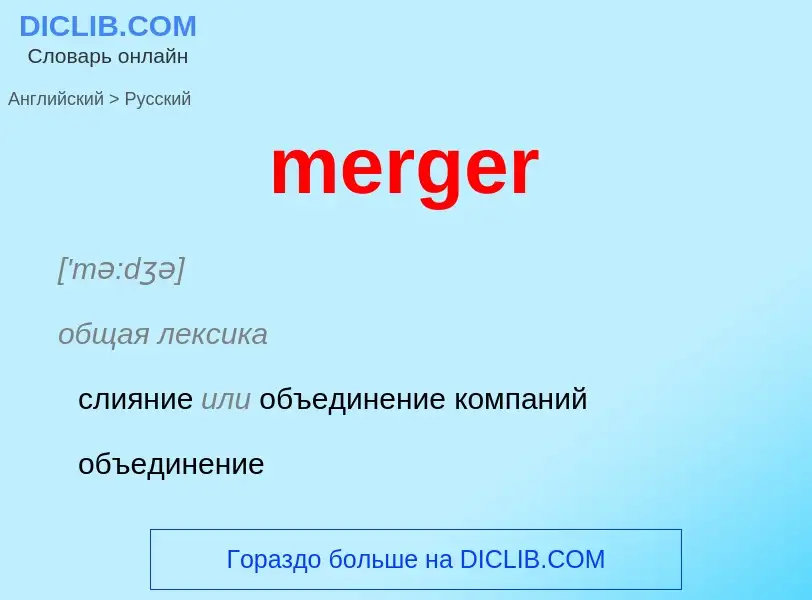Перевод и анализ слов искусственным интеллектом ChatGPT
На этой странице Вы можете получить подробный анализ слова или словосочетания, произведенный с помощью лучшей на сегодняшний день технологии искусственного интеллекта:
- как употребляется слово
- частота употребления
- используется оно чаще в устной или письменной речи
- варианты перевода слова
- примеры употребления (несколько фраз с переводом)
- этимология
merger - перевод на русский
['mə:dʒə]
общая лексика
слияние или объединение компаний
объединение
слияние
сращивание
существительное
общая лексика
слияние
объединение (чего-л.)
объединение (банков, предприятий и т. п.)
слияние политических партий
поглощение
слияние, объединение (торговое или промышленное)
юриспруденция
новация
синоним
- mergers and acquisitions
- conglomerate merger
- cross-frontier merger
- geographic market extension merger
- outright merger
- product extension merger
- pure conglomerate merger
- statutory merger
- stock-swap merger
- transnational merger
общая лексика
слившийся
2) вытеснять (напр. конкурентов из отрасли)
Определение
Википедия

Mergers and acquisitions (M&A) are business transactions in which the ownership of companies, business organizations, or their operating units are transferred to or consolidated with another company or business organization. As an aspect of strategic management, M&A can allow enterprises to grow or downsize, and change the nature of their business or competitive position.
Technically, a merger is the legal consolidation of two business entities into one, whereas anacquisition occurs when one entity takes ownership of another entity's share capital, equity interests or assets. A deal may be euphemistically called a "merger of equals" if both CEOs agree that joining together is in the best interest of both of their companies. From a legal and financial point of view, both mergers and acquisitions generally result in the consolidation of assets and liabilities under one entity, and the distinction between the two is not always clear.
In most countries, mergers and acquisitions must comply with competition law. In U.S. antitrust law, for example, the Clayton Act outlaws any merger or acquisition that may "substantially lessen competition" or "tend to create a monopoly", and the Hart–Scott–Rodino Act requires companies to get "pre-clearance" from either the Federal Trade Commission or the U.S. Department of Justice's Antitrust Division for all mergers or acquisitions over a certain size.


